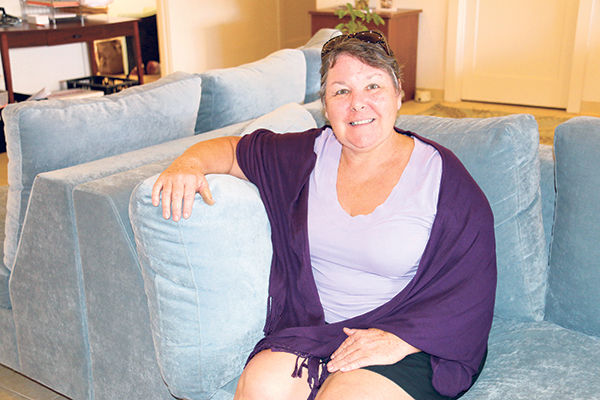LIHUE — October is Domestic Violence Awareness month. On Wednesday, the YWCA will shine a light on the issue of domestic violence with a candlelight vigil titled “Changing Hurt to Hope.” It will take place at St. Michael and All
LIHUE — October is Domestic Violence Awareness month. On Wednesday, the YWCA will shine a light on the issue of domestic violence with a candlelight vigil titled “Changing Hurt to Hope.” It will take place at St. Michael and All Angels Church and is open to the entire island community.
“Everyone should come,” says Kathy Freire, co-director of the YWCA of Kauai Family Violence Shelter.
“Domestic violence is not a topic most folks talk about,” Freire added. “It’s an uncomfortable issue.”
Yet it needs light and air around it, thus an evening of music and refreshments starting at 5 p.m.; time for domestic violence survivors to tell their stories starting at 6 p.m.; and at 7 p.m., candles will be lit in memory of those who have not survived domestic violence. Childcare will be available from 5:45 p.m. to 7 p.m.
Freire says domestic violence is not isolated, and affects not only the couples involved, but also their children, extended families and neighbors. It’s also a serious issue in the workplace, with absences due to physical or emotional abuse.
“Research shows that if a child grows up in a domestic violence situation, it changes the physiology of their brain, the way they think, and even, as they go to school and start to socialize, gives them a different view of the world, as if they don’t fit right or have to strike out to be safe,” she said.
Freire should know — been there, done that.
She looks back and says, “As a young teenager, from the time I started dating, I dated men who were abusive.”
“Due to abuse in my childhood, I didn’t have the self-worth to be with someone who is kind and really wanted a healthy relationship,” Freire explained. “I easily got hooked in with folks who were abusive and controlling — it was a pattern from relationship to relationship.”
Freire married, and she and her husband had four children during their 13 years together. Life was a series of explosions.
“Living with abuse for that length of time, trying to make it work, I was always thinking if I did something different, it wouldn’t be this bad,” Freire said. “But I could never do enough — I could never be good enough or perfect enough.
“When he punched me in the back while I was holding our infant, that was the defining moment of walking out and never looking back. He was endangering my infant child.”
“I had been to the shelter numerous times and had begun a network,” she continued. “I called a good friend, and she took my children and me until I got a restraining order for him to leave the house. The manipulation, emotional abuse, using the children — was ongoing. The abuse never stopped. And once he left, he would call to talk to the kids, and would try to use those phone calls to continue to perpetuate the abuse.”
Domestic violence crosses every socio-economic line, according to Freire — a claim backed up by studies and literature surrounding the topic.
“We’ve had women at the shelter who are homeless and poverty stricken as well as successful, powerful women, all of whom have somehow been caught in this cycle,” Freire said.
On Sept. 17, 2013, a National Census of Domestic Violence Services took a “snapshot” of domestic violence counts. In the entire United States, 87 percent of identified local domestic violence programs in the U.S. and territories participated in the count.
And on that day, 36,348 victims found refuge in emergency shelters or transitional housing provided by local domestic violence programs. In addition, 30,233 adults and children received non-residential assistance and services, including counseling, legal advocacy and children’s support groups.
In Hawaii on that same day, that “snapshot” showed that 70 percent of identified shelters offered a total of 217 domestic violence victims emergency shelters or transitional housing, and 358 adults and children received non-residential assistance and services, including counseling, legal advocacy and children’s support groups.
So far on Kauai, in the first quarter of the fiscal year, the YWCA has received over 300 crisis calls. Fifty-six women and children have sought shelter.
“My plea to everyone is don’t give up,” Freire said. “Successfully escaping domestic violence is a process and looks different for everyone — and if somebody’s not ready to leave, she will just go back.
The YWCA of Kauai, founded in 1921, offers numerous programs designed to overcome problems such as sexual assault, domestic and teen violence, education and prevention.
“Our domestic violence hotline at 245-6362 takes calls from survivors, also takes questions from folks who are in domestic violence and want to know how to get help. It’s OK to call, ask questions and get support and referrals,” Freire said.
For information about the candlelight vigil, call 245-8404.
For calls related to domestic violence, call the domestic violence crisis line at 245-6362. For calls related to sexual assault, call the sex assault crisis line at 245-4144. The YWCA office telephone number is 245-5959. All numbers operate 24/7.


